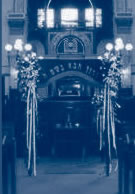|
SEDRA: EKEV HERTZ CHUMASH P.780 Deuteronomy
Chap. 7 verse 12
This week's Sedra is generously sponsored by Gideon Joseph.
SYNOPSIS:
Continuing his address to the whole people, Moses assured
them that prosperity and good health would follow their observance
of the Mitzvot. They had no need to fear the numerous Canaanites,
for G-d would be their protector. However, the conquest of
the land of Canaan was to be followed by the destruction of
all forms of idolatry. Moses commented that the forty years
of wandering in the desert served to test the people's loyalty
to G-d's commandments. The hardships there had disciplined
them to learn that "man does not live by bread alone,
but by everything that proceeds from the mouth of the L-rd."
Moses described the bountiful Eretz Yisrael including the
seven Minim (seven varieties of fruit). Moses warned that
the prosperity the Jews would enjoy in the Promised Land might
lead them to disregard G-d's role in their welfare. Such ingratitude
would be severely punished, and the disloyal Jews would share
the fate of the heathen nations who perished. Moses reminded
the people of their earlier acts of rebellion. After he had
spent forty days on the mountaintop receiving the Tablets
of Stone, he had returned to find the people worshipping the
Golden Calf. G-d had declared His intention to destroy the
people, but Moses interceded on their behalf. He had broken
the Tablets, destroyed the Golden Calf, and punished those
who had honoured it. He also recalled four other instances
of the people's disobedience, at Taberah, Massah, Kivrot Ha
Ta'avah and Kadesh Barnea.
After Moses had championed the Israel's cause by asking G-d
to recall the merits of the Patriarchs, G-d had told him to
return to the mountain to receive a second set of Tablets.
These were placed in the Holy Ark, the Aron HaKodesh. The
Kohanim and Levi'im had been appointed to perform the services
of the Mishkan,(Sanctuary) and permission had been given for
the people to continue the journey from Sinai towards Canaan.
All that G-d requires from the Jews, Moses said, is for them
to love, fear, and serve Him by keeping the Mitzvot. Their
personal knowledge of His greatness, manifested by such incidents
as the deliverance from Egypt, the miracle of the Red Sea,
the experiences in the desert, and the miraculous punishment
given to Korah, Datan and Aviram, should be sufficient to
assure their observance and fulfilment of the Mitzvot. The
commitment to G-d's laws would ensure a successful harvest
through the regularity of the autumn and spring rains; but
these would be withheld if the people became disobedient.
Moses assured the people that their adherence to the Torah
would result in their victory over the Canaanites and the
acquisition of extensive territory in the Promised Land.
HAPHTORAH HERTZ CHUMASH P. 794 Isaiah Chap 49 verse 14
This, Second in the Haphtorot of Consolation following Tish'a
B'av, in addition to its message of comfort also reiterates
many of the issues of spiritual identity and the opposition
to idolatry referred to in the Sedra. Although the Jewish
people have lost all hope, a restoration of their people and
land will surely come. Israel's enemies will no longer oppress
them, but will be destroyed through war amongst themselves.
The persistance of G-d's Covenant with Israel is affirmed.
"Where is your mother's Gett (bill of divorce)?"
It does not exist - Israel is still G-d's people. Reference
is then made to the ideals towards which Israel as "The
Servant of the Lord", who will experience "Joy and
gladness" in their own land, must aspire.
TELL ME RABBI ......... HAVDALAH
The spiritual uplift, impact and pleasure of Shabbat has
always been so great, that it is with regret that the Jew
parts from his Holy Day. It is to give expression to this
feeling, in the main, that the Havdalah prayer and ceremony
were instituted many centuries ago. As Maimonides said: "It
is as incumbent to remember the Shabbat at its conclusion,
through the Havdalah, as at its entrance, by way of Kiddush"
Havdalah means division. It underlines a distinction between
holy and profane and in the degrees of holiness. In the present
case it stresses the difference in sanctity between the Shabbat
and Festivals, and the weekdays. In the words of the Havdalah:
"Blessed art Thou, O, Lord, Our G-d, who makes a distinction
between holy and profane, between light and darkness, between
the seventh day and the six working days". (Talmud Pesachim).
ITS HISTORY
There are a number of views, some expressed in the Mishnah
and Talmud, as to the origin of Havdalah and the accompanying
ceremony. The Talmud reports that The men of the Great Synagogue,
the Sanhedrin of those days, inserted the Havdalah, as part
of the Amidah. Later on, as people's wealth increased, the
custom arose to recite it over a cup of wine, but reciting
it in the Shemoneh Esreh was retained. The Havdalah is inserted
in the Shemoneh Esreh in the prayer for wisdom, emphasizing
that only one with good sense can differentiate between the
holy and the profane. It seems that originally the Havdalah
was a synagogue rite and only later did it become a home ceremony.
Today Havdalah is recited in the synagogue and is repeated
at home for the members of the family.
THE CEREMONY
The Havdalah ceremony and benediction are preceded by three
blessings - over wine, spices and light.
THE WINE
The main blessing is recited over the wine, slightly overflowing
the brim of the cup, as a token and prayer for overflowing
Divine blessing. Rabbi Johanan said: "Three will inherit
the world to come: he who dwells in Eretz Israel; he who brings
up his sons to the study of the Torah, and he who recites
Havdalah over wine at the termination of the Shabbat".
THE SPICES
Said Resh Lakish: "Man is given an additional soul on
Friday, but at the termination of the Shabbat it departs from
him" This Neshama Yetera or "higher soul",
a product of the cheerfulness with which we are inspired on
the Shabbat, causes us to feel saddened when it is about to
depart. The fragrance of spices symbolically offers us comfort
and encouragement on the departure of the Shabbat, and spiritual
strength for the coming week.
THE LIGHT
A beautiful story in the Midrash provides the background for
the custom of the blessing over the light in the Havdalah:
"When the sun had set on Saturday night, after it had
given light to Adam during the whole Shabbat, and it was already
dark, Adam became very afraid. What did the Holy One, blessed
be He , do? He inspired Adam with divine knowledge so that
he took two stones, rubbed them against each other and produced
fire. Therefore, said R Samuel, our recital of a benediction
over the fire on Saturday night, recalls the time of the fire's
own creation".
By kindling the light, the first product of creation, and
by the recitation of the blessing thereon, we thank G-d for
the gift He has bestowed upon us - to be able to make use
of light. Every seeing human being has, indeed, good cause
to give thanks to the Almighty for being able to enjoy the
sight of light.
Because the benediction speaks of the creation of lights,
the candle for the Havdalah, should consist of several strands
twisted together, or of two ordinary candles, so that the
flames can merge into one, like a flambeau. It will be noted,
too, that, on reciting the blessing "He who creates fire",
we hold our hands against the light and the fingers are bent
inwards. This is done in illustration of the contrast between
light and darkness - showing darkness and shadow inside and
light outside. Thus again we demonstrate our thanks for the
blessings of the ancient light. We also avoid saying a Blessing
in vain by making use of the light.
BACK TO SHABBAT SHALOM
TABLE
|








